Fleurs du Mal Magazine


Or see the index
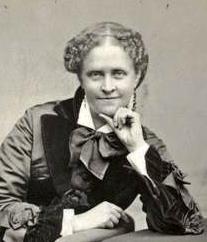
Helen (Maria) Hunt Jackson
(1830-1885)
To an Absent Lover
That so much change should come when thou dost go,
Is mystery that I cannot ravel quite.
The very house seems dark as when the light
Of lamps goes out. Each wonted thing doth grow
So altered, that I wander to and fro
Bewildered by the most familiar sight,
And feel like one who rouses in the night
From dream of ecstasy, and cannot know
At first if he be sleeping or awake.
My foolish heart so foolish for thy sake
Hath grown, dear one!
Teach me to be more wise.
I blush for all my foolishness doth lack;
I fear to seem a coward in thine eyes.
Teach me, dear one,–but first thou must come back!
Helen Hunt Jackson poetry
fleursdumal.nl magazine
More in: Archive I-J, CLASSIC POETRY
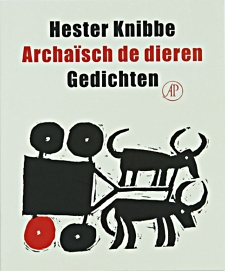
De Rotterdamse dichteres Hester Knibbe krijgt de prijs voor de beste Nederlandstalige dichtbundel van het afgelopen jaar voor haar bundel Archaïsch de dieren (Uitgeverij De Arbeiderspers). Knibbe ontving de prijs tijdens een feestelijke avond in de Kunsthal in Rotterdam uit handen van juryvoorzitter Peter Vandermeersch, hoofdredacteur van NRC Handelsblad. Aan de prijs is een geldbedrag van 25.000 euro verbonden en een glaskunstwerk van kunstenares Maria Roosen. Ook de dichters Piet Gerbrandy, Sasja Janssen, Alfred Schaffer en Peter Verhelst maakten kans op deze jaarlijkse prijs voor Nederlandstalige poëzie.
De jury roemt Knibbes stevige, klankrijke en toch hoogst hedendaagse vorm en taal waarmee ze in staat is grote vragen te stellen
waartoe zijn wij op aarde, hoe kunnen we samen leven terwijl
er zoveel ‘wonden op de wereld’ zijn, hoe kunnen we onze doden herdenken
zonder dat ze topzwaar worden of bezwijken onder hun eigen gewicht. In haar voldragen bundel keert Knibbe terug naar de wil tot weten van de allereerste mens en de verdrijving uit het paradijs die daarop volgt. Antwoorden zijn er niet te vinden in deze gedichten; de goden geven niet thuis. Mythische verbanden zijn er echter des te meer, bijvoorbeeld in de zangerige en klankrijke taal van Knibbe.
De jury was speciaal ingenomen met de sterke samenhang en dwingende stuwende kracht in deze belangrijke bundel, die de mens tot zijn ontgoochelende kern terugbrengt en vervolgens warm omhelst.
De jury, die naast voorzitter Peter Vandermeersch bestond uit uit Yra van Dijk, Ruth Joos, Peter Theunynck en Antoine de Kom, nomineerde in november vijf van de in totaal 107 ingezonden bundels die tussen 1 september 2013 en 31 augustus 2014 zijn verschenen. Uit alle ingezonden bundels koos juryvoorzitter Peter Vandermeersch zijn 100 favoriete gedichten voor de bloemlezing De 100 beste gedichten. De uitgave van De Arbeiderspers en Stichting VSB Poëzieprijs is tijdens de prijsuitreiking gepresenteerd en is vanaf vandaag verkrijgbaar in de boekhandel.
Ter gelegenheid van de Poëzieweek is het gedicht Laten we de oude … uit de winnende bundel Archaïsch de dieren van Hester Knibbe door Poetry International als poster uitgebracht. De poster is te bestellen via info@poetry.nl
# Meer informatie op website Poetry International
fleursdumal.nl magazine
More in: Archive K-L, Art & Literature News, Poetry International
Bert
BEVERS
Sedan, april 1940
Aan een grens een stadje dat
sluimert tegen verre heuvels.
Geen vijand valt er te bekennen.
Een officier te paard trekt
ter inspectie langs de wegen,
in handen los de teugels.
Onaangekondigd meldt de tijd
zich aan de poorten die
in rust gedompeld zijn.
Wat valt er hier dan meer te doen
dan in alledaagse sleur
te worden overrompeld?
Bert Bevers
(Verschenen in De Tweede Ronde, Amsterdam, 8ste jaargang, nummer 4)
fleursdumal.nl magazine
More in: *War Poetry Archive, Archive A-B, Bevers, Bert

Gedichtendag opent de Poëzieweek op de laatste donderdag van januari. In 2015 op donderdag 29 januari. Gedichtendag is hét poëziefeest van Nederland en Vlaanderen. Poëzieliefhebbers in Nederland en Vlaanderen organiseren die dag een grote diversiteit aan eigen poëzieactiviteiten en ook de media klinken die dag een stuk poëtischer.
In Vlaanderen wordt in Brussel op Gedichtendag 2015 een Dichters des Vaderlands-avond georganiseerd.
# Meer informatie website POËZIEWEEK
# Activiteiten poëzieweek Nederland
# Activiteiten poëzieweek Vlaanderen
fleursdumal.nl magazine
More in: Art & Literature News, Literary Events, MODERN POETRY, Poëzieweek
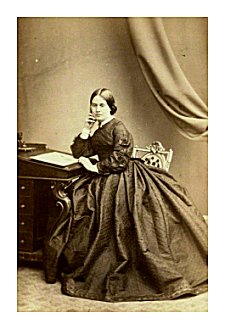
Jean Ingelow
(1820-1897)
On a Picture
As a forlorn soul waiting by the Styx
Dimly expectant of lands yet more dim,
Might peer afraid where shadows change and mix
Till the dark ferryman shall come for him.
And past all hope a long ray in his sight,
Fall’n trickling down the steep crag Hades-black
Reveals an upward path to life and light,
Nor any let but he should mount that track.
As with the sudden shock of joy amazed,
He might a motionless sweet moment stand,
So doth that mortal lover, silent, dazed,
For hope had died and loss was near at hand.
‘Wilt thou?’ his quest. Unready but for ‘Nay,’
He stands at fault for joy, she whispering ‘Ay.’
Jean Ingelow poetry
fleursdumal.nl magazine
More in: Archive I-J, CLASSIC POETRY
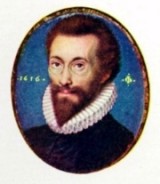
John Donne
(1572-1631)
Song: Go and catch a falling star
Goe, and catche a falling starre,
Get with child a mandrake roote,
Tell me, where all past yeares are,
Or who cleft the Divels foot,
Teach me to heare Mermaides singing,
Or to keep off envies stinging,
And find
What winde
Serves to advance an honest minde.
If thou beest borne to strange sights,
Things invisible to see,
Ride ten thousand daies and nights,
Till age snow white haires on thee,
Thou, when thou retorn’st, wilt tell me
All strange wonders that befell thee,
And sweare
No where
Loves a woman true, and faire.
If thou findst one, let mee know,
Such a Pilgrimage were sweet;
Yet doe not, I would not goe,
Though at next doore wee might meet,
Though shee were true, when you met her,
And last, till you write your letter,
Yet shee
Will bee
False, ere I come, to two, or three.
John Donne poetry
fleursdumal.nl magazine
More in: Archive C-D, Donne, John
Bert
BEVERS
Picknick in Picardië
In de bossen rond Compiègne
dronk ik bier en brak ik brood.
Elke rust kwam over mij,
zo bloot als mijn gedachten waren
en ik genoot van alle dagen,
alle nachten die ons nog
te wachten staan. Van al die
bomen, al dat gras en
al die struiken bedacht ik geen
geschiedenis: ik liet ze ruiken
naar wat nog voor te vallen is.
Van mensenheugenis was niets te merken.
Bert Bevers
(Verschenen in De Tweede Ronde, Amsterdam, 8e jaargang, nummer 4)
fleursdumal.nl magazine
More in: Archive A-B, Bevers, Bert
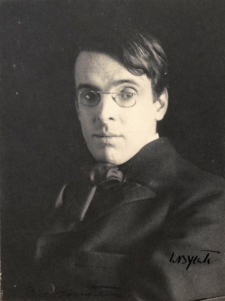
William Butler Yeats
(1865-1939)
The Folly Of Being Comforted
One that is ever kind said yesterday
‘Your well-beloved’s hair has threads of grey,
And little shadows come about her eyes;
Time can but make it easier to be wise
Though now it seems impossible, and so
Patience is all that you have need of.’ No,
I have not a crumb of comfort, not a grain;
Time can but make her beauty over again;
Because of that great nobleness of hers
The fire that stirs about her, when she stirs
Burns but more clearly. O she had not these ways,
When all the wild summer was in her gaze.
O heart! O heart! if she’d but turn her head,
You’d know the folly of being comforted.
William Butler Yeats poetry
fleursdumal.nl magazine
More in: Archive Y-Z, Yeats, William Butler
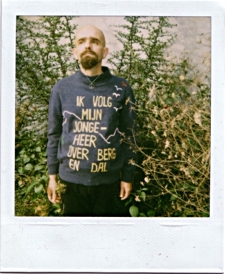 Dichter Martin Beversluis viert in 2015 zijn 20-jarig jubileum, en trapt op gedichtendag zijn jubileumjaar af met de presentatie van zijn minibundel ‘De liefde begonnen’. De minibundel bestaat uit 9 gedichten op muziek. Evelien van Breemen verzorgde de vormgeving en Tom Pijnenburg maakte bij één van de gedichten een video. ‘De liefde begonnen’ is vanaf gedichtendag gratis te downloaden via www.beversluis.com en via www.telexpress.nl. De presentatie vindt plaats tijdens Beyond Borders: gedichtendag in de Polygonale Loods aan de Burgemeester Brokxlaan in Tilburg. De toegang is gratis.
Dichter Martin Beversluis viert in 2015 zijn 20-jarig jubileum, en trapt op gedichtendag zijn jubileumjaar af met de presentatie van zijn minibundel ‘De liefde begonnen’. De minibundel bestaat uit 9 gedichten op muziek. Evelien van Breemen verzorgde de vormgeving en Tom Pijnenburg maakte bij één van de gedichten een video. ‘De liefde begonnen’ is vanaf gedichtendag gratis te downloaden via www.beversluis.com en via www.telexpress.nl. De presentatie vindt plaats tijdens Beyond Borders: gedichtendag in de Polygonale Loods aan de Burgemeester Brokxlaan in Tilburg. De toegang is gratis.
‘De liefde begonnen’ bestaat uit oud en nieuw werk. De titel refereert aan het motto van gedichtenweek 2015: ‘Met zingen is de liefde begonnen’. De muziek nam de dichter eind 2014 thuis op. Daarbij werkte Martin Beversluis samen met muzikant Jeroen Geurts. Komend najaar zal er nog een dichtbundel van Martin Beversluis verschijnen. Die bundel gaat ‘Meandertaler‘ heten en komt in september 2015 uit bij Uitgeverij teleXpress.
Al voor de publicatie van ‘De liefde begonnen‘ vervolgt Martin Beversluis zijn eeuwigdurende ‘Consumptiebonnentour’ met optredens op de meest uiteenlopende Nederlandse en voor het eerst ook Belgische podia. Zo staat hij op 24 januari in Café Lambiek tijdens het Red De Pollepel Festival, op 25 januari schuift Martin aan bij het Cultureel Café in De NWE Vorst en op 7 februari treedt hij op in Turnhout bij De Sprekende Ezels. Daarnaast blijft Beversluis actief als organisator en presentator van de Tilburgse poetry slam Podiumvlees (samen met Daan Taks) en van Beyond Borders: Poëzie Polygonaal. En Martin Beversluis gaat uiteraard nog meer activiteiten in het kader van zijn jubileumjaar organiseren.
Daarvan kunt u op de hoogte blijven via zijn website en zijn facebookpagina (én fleursdumal.nl magazine).
fleursdumal.nl magazine
More in: - Book News, Archive A-B, Art & Literature News, Beversluis, Martin, Poetry Slam
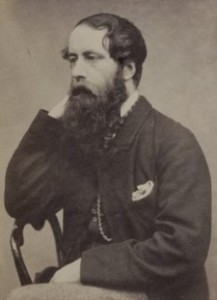
Arthur Munby
(1828-1910)
Post Mortem
I lay in my coffin under the sod;
But the rooks they caw’d, and the sheep they trod
And munch’d and bleated, and made such a noise–
What with the feet of the charity boys
Trampling over the old grave-stones–
That it loosen’d my inarticulate bones,
And chased my sleep away.
So I turn’d (for the coffin is not so full
As it was, you know) my aching skull;
And said to my wife–and it’s not my fault
If she does lie next to me in the vault–
Said to her kindly, “My love, my dear,
How do you like these sounds we hear
Over our heads to-day?”
My wife had always a good strong voice;
But I’m not so sure that I did rejoice
When I found it as strong as it used to be,
And so unexpectedly close to me:
I thought, if her temper should set in,
Why, the boards between us are very thin,
And whenever the bearers come one by one
To deposit the corpse of my eldest son,
Who is spending the earnings of his papa
With such sumptuous ease and such great eclat,
They may think it more pleasant, perhaps, than I did,
To find that in death we were not divided.
However, I trusted to time and the worms;
And I kept myself to the mildest terms
Of a conjugal “How d’ye do.”
“John,” said my wife, “you’re a Body, like me;
At least if you ain’t, why you ought to be;
And I really don’t think, when I reflect,
That I ought to pay as much respect
To a rattling prattling skeleton
As I did to a man of sixteen stone.
However” (says she), “I shall just remark
That this here place is so cool and dark,
I’m certain sure, if you hadn’t have spoke,
My slumber’d never have thus been broke;
So I wish you’d keep your–voice in your head;
For I don’t see the good of being dead,
If one mayn’t be quiet too.”
She spoke so clear and she spoke so loud,
I thank’d my stars that a linen shroud
And a pair of boards (though they were but thin)
Kept out some part of that well-known din:
And, talking of shrouds, the very next word
That my empty echoing orbits heard
Was, “Gracious me, I can tell by the feel
That I’m all over rags from head to heel!
Here’s jobs for needle and thread without ending,
For there’s ever-so-many holes wants mending!”
“My love,” I ventured to say, “I fear
It’s not much use, your mending ’em here;
For, as fast as you do, there’s worse than moth,
And worse than mice, or rats, or both,
Will eat up the work of your cotton ball
And leave you never a shroud at all–
No more than they have to me.”
Now, whether it was that she took it ill
My seeking to question her feminine skill,
Or whether ’twas simply that we were wedded–
The very thing happen’d that I most dreaded:
For, by way of reply, on the coffin-side,
Just where the planks had started wide,
There came a blow so straight and true
That it shook my vertebral column in two;
And what more might have follow’d I cannot tell,
But that very minute (’twas just as well)
The flagstone was lifted overhead,
And the red-nosed buriers of the dead
Let down a load on my coffin-plate
That stunned me quite with the shock of its weight.
‘Twas the corpse, of course, of my eldest son,
Who had injured his brain (a little one)
By many a spirituous brain-dissolver,
And finish’d it off with a Colt’s revolver.
Well–when they had gone and the noise had ceased,
I look’d for one other attack, at least:
But, would you believe it? The place was quiet,
And the worms resumed their usual diet!
Nay, everything else was silent too;
The rooks they neither caw’d nor flew,
And the sheep slept sound by footstone and head,
And the charity boys had been whipp’d to bed.
So I turn’d again, and I said to myself–
“Now, as sure as I’m laid on this sordid shelf
Away from the living that smile or weep,
I’ll sleep if I can, and let her too sleep:
And I will not once, for pleasure or pain,
Unhinge my jaws to speak again,
No, not if she speaks to me.”
Arthur Munby poetry
fleursdumal.nl magazine
More in: Archive M-N, Arthur Munby & Hannah Cullwick, CLASSIC POETRY, Munby & Cullwick
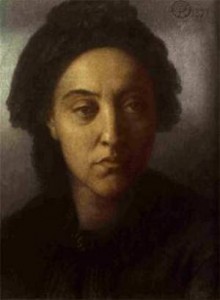
Christina Georgina Rossetti
(1830-1894)
The Wind
Who has seen the wind?
Neither I nor you;
But when the leaves hang trembling
The wind is passing through.
Who has seen the wind?
Neither you nor I;
But when the trees bow down their heads
The wind is passing by.
Christina Georgina Rossetti poetry
fleursdumal.nl magazine
More in: Archive Q-R, Rossetti, Christina
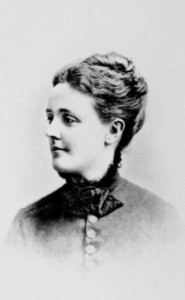
(Theodora) Sarah Orne Jewett
(1849-1909)
Missing
You walked beside me, quick and free;
With lingering touch you grasped my hand;
Your eyes looked laughingly in mine;
And now ? I can not understand.
I long for you, I mourn for you,
Through all the dark and lonely hours.
Heavy the weight the pallmen lift,
And cover silently with flowers.
Sarah Orne Jewett poetry
fleursdumal.nl magazine
More in: Archive I-J, CLASSIC POETRY
Thank you for reading Fleurs du Mal - magazine for art & literature